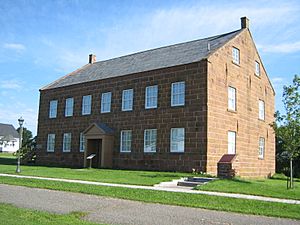Farmers' Bank of Rustico facts for kids

Farmers' Bank of Rustico
|
|
| Industry | Banking |
|---|---|
| Fate | Charter not renewed |
| Founded | April 21, 1863 |
| Founder | Georges-Antoine Belcourt |
| Defunct | 1894 |
| Headquarters |
Rustico (now Lot 24), Prince Edward Island
,
Canada
|
The Farmers' Bank of Rustico was a special bank that operated in the small village of Rustico, Prince Edward Island. It was open from 1864 to 1894. Many people believe it was the very first community-based bank in all of Canada.
This unique bank was started and led by Father Georges-Antoine Belcourt (1803-1874). It officially began on April 21, 1863. The bank received special approval from the Queen in England on April 7, 1864. A farmer named Jerome Doiron was its first president, and a local school teacher, Marinus Blanchard, was the first cashier.
What Made the Farmers' Bank Special?
The Farmers' Bank was a very early example of what we now call a credit union. It even influenced Alphonse Desjardins of Quebec, who helped start the credit union movement in North America.
Like credit unions today, the Farmers' Bank accepted money from people (deposits) and offered loans. Most of these loans were for less than one year. It proved that people in a village could successfully run a financial business without needing expert bankers.
However, there were some differences. The bank printed its own money and kept its working funds in "specie." This means they used gold or silver coins. The bank also gave most of its yearly profits back to its shareholders instead of building up a large savings fund.
Helping the Acadian Community Grow
The Farmers' Bank was also an important step for the Acadian people to gain more control over their own economy. Father Belcourt had many new ideas. He also helped create many "seed grain banks" in Acadian communities in the 1860s. These banks helped farmers get seeds for planting.
The Farmers' Bank also showed the way for the `Mouvement des caisses populaires acadiennes`. This is a large network of credit unions in New Brunswick today, with over 200,000 members.
The bank played a big role in helping the Acadian community in the Maritimes region. For about 30 years, it offered affordable loans. This helped the mostly Acadian community become more financially independent. However, a new Canadian Bank Act in 1871 did not allow such small banks. So, when the Farmers' Bank's special permission (its charter) was not renewed in 1894, it had to close down.
Farmers' Bank of Rustico Museum
Today, the original Farmers' Bank of Rustico building in Rustico, Prince Edward Island, is a National Historic Site. It was built between 1861 and 1863. Now, it serves as a local history museum.
At the museum, you can learn about Father Georges-Antoine Belcourt and the bank's history. You can also explore Acadian culture, the local fishing industry, and the natural history of the area. Your admission to the museum also includes a tour of the nearby Doucet House. This old home was moved to the site in 1999 and has been restored to look like it did when pioneers lived there.
 | Bayard Rustin |
 | Jeannette Carter |
 | Jeremiah A. Brown |

